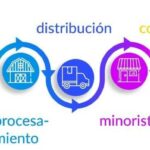
1. Importance of Traceability in Supply Chains
🔎 The importance of traceability in supply chains cannot be overstated. In an era where consumers are increasingly conscious about the origins of the products they purchase, businesses are under pressure to provide transparent and reliable information about the journey of their products from production to the shelves. Traceability ensures accountability and allows companies to address any issues related to quality, safety, and sustainability.
🌍 One of the key benefits of traceability is the ability to quickly identify and resolve product recalls or quality issues. By implementing robust traceability systems, companies can track each component or ingredient used in their products, allowing them to pinpoint the source of any problems and implement corrective actions. This not only ensures consumer safety but also protects the reputation and financial stability of the business.
✊ Traceability also plays a significant role in ensuring ethical and sustainable practices throughout the supply chain. By tracing the origin of raw materials, companies can verify that their suppliers adhere to environmentally friendly practices, fair labor standards, and other ethical guidelines. This information empowers consumers to make informed choices and supports businesses that prioritize social and environmental responsibility.
💼 Furthermore, traceability enhances supply chain efficiency. By having visibility into each step of the supply chain, businesses can identify bottlenecks, reduce waste, and optimize processes. This results in cost savings, improved customer satisfaction, and a more streamlined and responsive supply chain network.
By embracing traceability, businesses can meet the growing demands of consumers who seek transparency and responsible sourcing. It enables companies to build trust and loyalty among consumers, achieve sustainability goals, and enhance operational efficiency. Traceability is not just a buzzword; it has become a necessity in today’s interconnected and conscious consumer landscape.
2. Enhancing Product Safety and Consumer Trust through Traceability
🔎✅ Enhancing Product Safety and Consumer Trust through Traceability 💼🔐
In today’s fast-paced world, consumers have become increasingly concerned about the safety and origin of the products they purchase. With an ever-growing number of product recalls and safety-related incidents, it has become crucial for businesses to prioritize enhancing product safety and consumer trust. One effective strategy to achieve this is through traceability.
⚙️✨ Traceability refers to the ability to track and trace a product’s journey from its origin to its final destination. By implementing a robust traceability system, businesses can ensure transparency and accountability at every stage of the product lifecycle. From raw material sourcing to manufacturing, distribution, and even post-sales support, traceability empowers businesses to monitor and manage their products more effectively.
🧪🛡️ The benefits of implementing traceability systems are numerous. Firstly, it allows businesses to quickly identify and isolate any potential safety issues or product defects. This proactive approach not only protects consumers but also helps businesses minimize the financial and reputational damage caused by product recalls or safety-related incidents. By taking prompt action, businesses can maintain trust and confidence among their customers.
📦📊 Additionally, traceability systems enable businesses to ensure compliance with regulatory standards and industry best practices. By having detailed information about the origin, composition, and processing of their products, companies can demonstrate their commitment to quality and safety. This, in turn, enhances consumer trust, as customers feel more confident knowing that businesses are accountable for the safety and integrity of their products.
💡🌐 Moreover, traceability can also address ethical concerns associated with the sourcing of raw materials. Through traceability systems, companies can provide information about the sustainability and ethical practices employed in their supply chain. This transparency helps consumers make more informed choices and supports businesses that are committed to social and environmental responsibility.
🔍🗃️ From a consumer perspective, traceability provides peace of mind. Knowing that the product they are purchasing has been thoroughly monitored and tested for safety not only builds trust but also reassures consumers about the authenticity and quality of the product. This level of reassurance is particularly important in industries such as food and pharmaceuticals, where the health and well-being of consumers are at stake.
✅💪 In conclusion, enhancing product safety and consumer trust through traceability is not just a business imperative but also a moral responsibility. By implementing traceability systems, businesses can ensure they are delivering safe and reliable products to consumers, while also demonstrating their commitment to transparency, accountability, and ethical practices. Ultimately, traceability helps build stronger relationships between businesses and consumers and contributes to a safer and more trustworthy marketplace.
- 🌳🔍 Descubre la importancia de la www trazabilidad forestal en nuestra sociedad
- 🔍💡 Todo lo que necesitas saber sobre la 🔎trazabilidad COVID: ¿Cómo funciona y por qué es importante?
- 🔍✨ Descubre la importancia de la trazabilidad de las muestras: ¡Asegura la calidad en tu laboratorio!
- 🐮✅ La importancia de la trazabilidad ganadería: ¿Cóm
- 🔎📦 Trazabilidad Obligatoria: Todo lo que necesitas saber para cumplir con los requisitos 📋🔍
3. The Benefits of Implementing Traceability Technologies
🔍 The Benefits of Implementing Traceability Technologies 📊
Implementing traceability technologies has become an essential aspect in various industries. From food production to supply chain management, the use of traceability technologies offers numerous benefits that can improve processes and ensure customer safety. In this post, we will explore the advantages of implementing these technologies and how they can positively impact businesses.
🌽 One important benefit of implementing traceability technologies is increased transparency. With these technologies, businesses can track and monitor the entire journey of their products, from raw materials to the final destination. This transparency not only instills trust among consumers but also helps businesses to identify and rectify any issues in the supply chain quickly.
💡 Furthermore, traceability technologies enable businesses to enhance product quality. By accurately tracing each stage of production, companies can identify potential quality defects or issues in real-time. This allows them to take immediate action, preventing further quality-related problems and ensuring that customers receive only the best products.
🌍 Another advantage of traceability technologies is the ability to meet regulatory requirements. Many industries have specific regulations and standards that businesses must adhere to. By implementing traceability technologies, companies can easily demonstrate compliance with these regulations, avoiding penalties and legal issues.
✅ Moreover, traceability technologies help improve overall efficiency. By having a clear view of the entire production and supply chain process, businesses can identify bottlenecks, streamline operations, and optimize resources. This leads to cost savings and increased productivity, ultimately benefiting both businesses and customers.
🔒 Last but not least, implementing traceability technologies can significantly enhance product safety. With the ability to track and trace products, companies can quickly locate and recall items affected by contamination or safety concerns. This proactive approach ensures the well-being of consumers and protects businesses from potential liabilities.
In conclusion, the benefits of implementing traceability technologies are undeniable. From increased transparency and improved product quality to meeting regulatory requirements and enhancing overall efficiency, these technologies offer a range of advantages. Businesses that embrace traceability technologies not only ensure their own success but also prioritize the safety and satisfaction of their customers. 💼
4. Regulations and Standards for Ensuring Traceability
🔍 En la actualidad, las regulaciones y normas son fundamentales para garantizar la trazabilidad en diversas industrias. La trazabilidad se refiere a la capacidad de rastrear y seguir el camino de un producto a lo largo de la cadena de suministro, desde su origen hasta llegar al consumidor final. Esto es crucial para garantizar la calidad, seguridad y autenticidad de los productos.
🔒 En muchos sectores, como el alimentario y farmacéutico, existen estrictas regulaciones y estándares que las empresas deben cumplir para garantizar la trazabilidad. Estas regulaciones exigen que se lleve un registro detallado de todas las etapas del proceso, desde la producción, el almacenamiento, el transporte y la distribución. Asimismo, se requiere que se utilicen tecnologías y sistemas robustos para facilitar la trazabilidad.
📝 Uno de los estándares más reconocidos internacionalmente es la norma ISO 22005, que establece los requisitos para el sistema de trazabilidad en la cadena de suministro de alimentos y piensos. Esta norma asegura que los productos sean identificados, registrados y etiquetados correctamente, y que se puedan realizar trazas en caso de incidentes o problemas de seguridad.
💼 Además de las normativas internacionales, cada país también tiene sus propios reglamentos y leyes relacionadas con la trazabilidad. Por ejemplo, en la Unión Europea, existe el Reglamento (UE) 178/2002, que establece principios y requisitos generales de la legislación alimentaria, incluyendo la trazabilidad.
💡 La trazabilidad no solo es importante desde el punto de vista legal, sino también como una herramienta estratégica para las empresas. Permite identificar posibles fallos en la cadena de suministro y tomar medidas correctivas de forma rápida y eficiente. Además, brinda confianza a los consumidores, ya que pueden conocer el origen y la calidad de los productos que adquieren.
🌐 En resumen, las regulaciones y estándares para garantizar la trazabilidad son fundamentales para la transparencia y la integridad de las cadenas de suministro. Tanto las normas internacionales como las nacionales juegan un papel crucial en asegurar que los productos sean seguros, auténticos y de calidad. Además, la trazabilidad es una herramienta estratégica que brinda confianza a los consumidores y permite a las empresas ser más eficientes y efectivas en sus operaciones.
5. Future Trends in Traceability: From Blockchain to IoT
🔎⚙️ Future Trends in Traceability: From Blockchain to IoT ⚡️
🌐 In today’s increasingly interconnected world, the need for traceability is becoming more vital than ever. The ability to track and verify the origins and journey of products has significant implications for supply chain transparency, consumer trust, and overall product quality. As technology continues to advance, two trends are poised to shape the future of traceability: blockchain and the internet of things (IoT). These innovative technologies hold immense potential in revolutionizing the way we trace and authenticate products from farm to fork or factory to consumer.
💎💻 Blockchain technology, best known for its association with cryptocurrency, has emerged as a game-changer in the realm of traceability. Utilizing an immutable ledger that records transactions or events in a secure and transparent manner, blockchain enables the creation of trustworthy and auditable supply chains. By leveraging blockchain, companies can ensure the traceability of products, reducing the risk of counterfeit goods and enabling quick identification of any possible issues or recalls. The decentralized nature of blockchain also eliminates the need for intermediaries, streamlining processes and enhancing efficiency.
💡📲 As we delve further into the digital age, the internet of things (IoT) is playing an increasingly integral role in enhancing traceability. The IoT refers to the network of interconnected devices that can collect and exchange data. When applied to traceability, IoT devices can be embedded with sensors to monitor and track products at various stages of the supply chain. From temperature sensors in refrigerated trucks to RFID tags on individual items, IoT enables real-time monitoring, ensuring product integrity and enhancing consumer confidence. Moreover, the data collected by IoT devices can be integrated with blockchain technology, further securing and validating the traceability of products.
🌱 The combination of blockchain and IoT holds tremendous potential for industries such as food, pharmaceuticals, and luxury goods. In the food industry, for instance, blockchain and IoT technologies can ensure the safety and provenance of products, detect and prevent food fraud, and facilitate efficient recalls in case of contamination. In the pharmaceutical sector, the integration of blockchain and IoT can provide end-to-end visibility of pharmaceutical products, reducing the risks of counterfeit drugs and enhancing patient safety. Similarly, in the luxury goods market, these technologies can combat counterfeiting and protect brands, offering consumers the assurance of authenticity.
🚀 The future of traceability lies in the seamless integration of blockchain and IoT technologies. Together, they can enable transparent and auditable supply chains, empower consumers with reliable information, and create a culture of trust in our global marketplace. As more companies recognize the value of these innovations, we can expect to see a rapid adoption of blockchain and IoT in the traceability landscape. Embracing these future trends will not only benefit businesses but also safeguard consumer welfare and contribute to a more sustainable and accountable economy.
 🔍✅ Trazabilidad en enfermería: ¡Descubre cómo optimizarla para mejorar la atención sanitaria!
🔍✅ Trazabilidad en enfermería: ¡Descubre cómo optimizarla para mejorar la atención sanitaria! 📝💡 ¡Descubre los mejores lenguajes de trazabilidad para potenciar tu negocio!
📝💡 ¡Descubre los mejores lenguajes de trazabilidad para potenciar tu negocio! 🔍 ¿Qué es la trazabilidad del servicio al cliente? Descubre cómo mejorar la experiencia del cliente con esta herramienta vital
🔍 ¿Qué es la trazabilidad del servicio al cliente? Descubre cómo mejorar la experiencia del cliente con esta herramienta vital 🔍 ¿Por qué la falta de trazabilidad es un problema que debes resolver en tu negocio?
🔍 ¿Por qué la falta de trazabilidad es un problema que debes resolver en tu negocio? 📦✅ La trazabilidad Servientrega: una guía completa para un seguimiento preciso de tus envíos
📦✅ La trazabilidad Servientrega: una guía completa para un seguimiento preciso de tus envíos 📬 ¡Descubre la importancia de la 📍trazabilidad correo📦 y mejora tu experiencia de entrega!
📬 ¡Descubre la importancia de la 📍trazabilidad correo📦 y mejora tu experiencia de entrega! 🔎✍️ Descubre qué es la trazabilidad y por qué es importante en tu negocio
🔎✍️ Descubre qué es la trazabilidad y por qué es importante en tu negocio 📦🇺🇾 Descubre los beneficios de la trazabilidad en Uruguay: ¡Un paso hacia la transparencia!
📦🇺🇾 Descubre los beneficios de la trazabilidad en Uruguay: ¡Un paso hacia la transparencia!